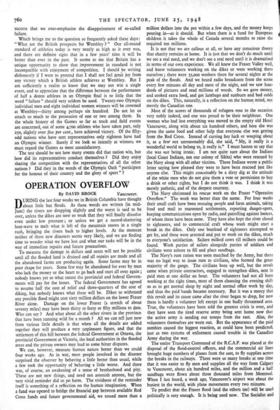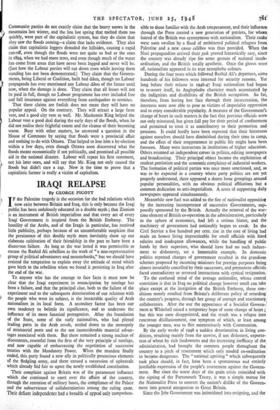OPERATION OVERFLOW
By DAVID BROCK Vancouver.
DURING the last four weeks we in British Columbia have thought about little but floods. As these words are written (in mid- June) the rivers are dropping slightly and the worst is said to be over, unless the dikes are now so weak that they will finally dissolve even under low pressure ; or unless we get a record-shattering heat-wave to melt what is left of the mountain snows in a single rush, bringing the rivers back to higher levels. At the moment neither of these new disasters seems very likely, and we are finding time to wonder what we have lost and what our tasks will be in the way of immediate repairs and future precautions.
To measure the damage in dollars and cents will not be possible until all the flooded land is drained and all repairs are made and all the abandoned farms are producing again. Some farms may be in poor shape for years. Some few may be abandoned for ever by men who lack the money or the heart to go back and start all over again ; nobody knows yet to what extent the provincial and federal Govern- ments will pay for the losses. The federal Government has agreed to assume half the cost of relief and three-quarters of the cost of diking, but nobody knows what these will be. Dikes to withstand any possible flood might cost sixty million dollars on the lower Fraser River alone. Damage on the lower Fraser (a stretch of about seventy miles) may have been thirty or forty or fifty millions to date. Who can say ? And what about all the other rivers in the province that have been running wild for a month ? All we can tell just now from various little details is that when all the details are added together they will produce a very unpleasant figure, and that the settlement of this bill between the federal Government at Ottawa, the provincial Government at Victoria, the local authorities in the flooded areas and the private owners may lead to some bitter disputes.
We can, however, measure human nature better than we could four weeks ago. As in war, most people involved in the disaster surprised the observer by behaving a little better than usual, while a few took the opportunity of behaving a little worse. And there was, of course, an awakening of a sense of brotherhood and pity. These are not new things, and need not astonish anyone, but the very vivid reminder did us no harm. The vividness of the reminder itself is something of a reflection on the human imagination. When a fund was opened to bridge the financial gap between available Red Cross funds and future governmental aid, we tossed more than a
million dollars into the pot within a few days, and the money keeps pouring in—as it should. But when there is a fund for European children it takes the whole of Canada several months to raise the required ten millions.
It is not that we are callous at all, or have any conscious theory that charity remains at home. It is just that we don't do much until we see a real need, and we don't see a real need until it is dramatised in terms of our own experience. We all knew the Fraser Valley well, and knew volunteers working on the dikes or were working there ourselves ; there were 35,000 workers there for several nights at the peak of the floods. And we heard radio broadcasts from the scene every few minutes all day and most of the night, and we saw hun- dreds of pictures and read millions of words. So we gave money, and cooked extra food, and got lumbago and sunburn and bad colds on the dikes. This, naturally, is a reflection on the human mind, not merely the Canadian one.
Most of the scores of thousands of refugees rose to the occasion very nobly indeed, and one was proud to be their neighbour. One woman who had lost everything was moved to the empty old Hotel Vancouver, along with about six hundred others, and here she was given the same food and other help that everyone else was getting from the Red Cross. Instead of cursing her luck or weeping about it, as a few' not unreasonably did, she said, " My, it really is a wonderful world to belong to, it really is." I must hasten to say that she was not being ironic. I am not quite sure about the Indians (local Coast Indians, not our colony of Sikhs) who were rescued by the Navy along with all other victims. These Indians wrote a public letter saying how pleased they were to have been rescued just like anyone else. This might conceivably be a dirty dig at the attitude of the white men who do not give them a vote or permission to buy a drink or other rights, but I do not think it was. I think it was merely pathetic, and of the deepest courtesy.
The Navy christened its rescue work on the Fraser " Operation Overflow." The work was better than the name. For four weeks their small craft have been rescuing people and farm animals, taking food and mail to marooned settlements, reporting danger-spots, keeping communications open by radio, and patrolling against looters, of whom there have been none. They have also kept the river closed to sightseers, and to commercial craft whose wash might start a break in the dikes. Only one boatload of sightseers attempted to get by, and these were arrested and put to work on the dikes, much to everyone's satisfaction. Sailors milked cows till milkers could be found. Work parties of sailors alongside parties of soldiers and civilians went ashore to fill and place sandbags.
The Navy's rum ration was soon matched by the Army, but there was no legal way to issue rum to civilians, who formed the great majority of the gangs. The civilians bore up well, but the revolt came when private contractors, engaged to strengthen dikes, sent in paid men at one dollar an hour. The volunteers had not all been working at the right times, most of them choosing the evening shift so as to get normal sleep by night and normal office work by day, and thus the paid hands became necessary. But it was a mercy that this revolt and its cause came after the river began to drop, for now there is hardly a volunteer left except in one badly threatened area. True, the volunteers have been told the greatest crisis is over, and they have seen the tired reserve army being sent home now that the active army is sending out troops from the east. Also, the volunteers themselves are worn out. But the appearance of the paid zombies caused the biggest reaction, as could have been predicted, just as two systems of enlistment caused trouble iri the Canadian Army during the war.
The entire Transport Command of the R.C.A.F. was placed at the disposal of the flood-control officers, and the commercial air lines brought huge numbers of planes from the east, to fly supplies across the breaks in the railways. There were so many breaks at one time that it was easier to fly men and supplies all the way from Calgary to Vancouver, about six hundred miles, and the million and a half sandbags were flown about three thousand miles from Montreal. When I last heard, a week ago, Vancouver's airport was about the busiest in the world, with plane movements every two minutes.
To predict that the Fraser flood (and the others too) will be used politically is easy enough. It is being used now. The Socialist and
Communist parties do not exactly claim that the heavy snows in the mountains last winter, and the late hot spring that melted them too quickly, were part of the capitalistic system, but they do claim that they saw the floods coming—a claim that lacks evidence. They also claim that capitalistic loggers denuded the hillsides, causing a rapid run-off, even though the floods were not quite so bad as the ones in 1894, when we had more trees, and even though much of the water has come from areas that have never been logged and never will be. (Just how the Labour parties will cut down trees while leaving them standing has not been demonstrated.) They claim that the Govern- ments, being Liberal or Coalition, built bad dikes, though no Labour propaganda has ever mentioned any Labour dikes of the future until now, when the damage is done. They claim that all losses will not be paid in full, though no Labour programme has ever included free and full insurance against everything from earthquakes to termites.
That these claims are foolish does not mean they will have no popular appeal. On the contrary. They will attract a large farm vote, and a good city vote as well. Mr. Mackenzie King helped the Labour vote a good deal during the early days of the floods, when he did not realise their frightful extent and the chance of their becoming worse. Busy with other matters, he answered a, question in the House of Commons by saying that floods were a provincial affair and nothing to do with Ottawa. That helped to lose him a by-election within a few days, even though Ottawa soon discovered what the floods meant economically if not politically, and promised all possible aid in the national disaster. Labour will repeat his first statement, not his later ones, and will say that Mr. King not only caused the floods but didn't care a rap. Now is the time to prove that a capitalistic fanner is really a victim of capitalism































 Previous page
Previous page